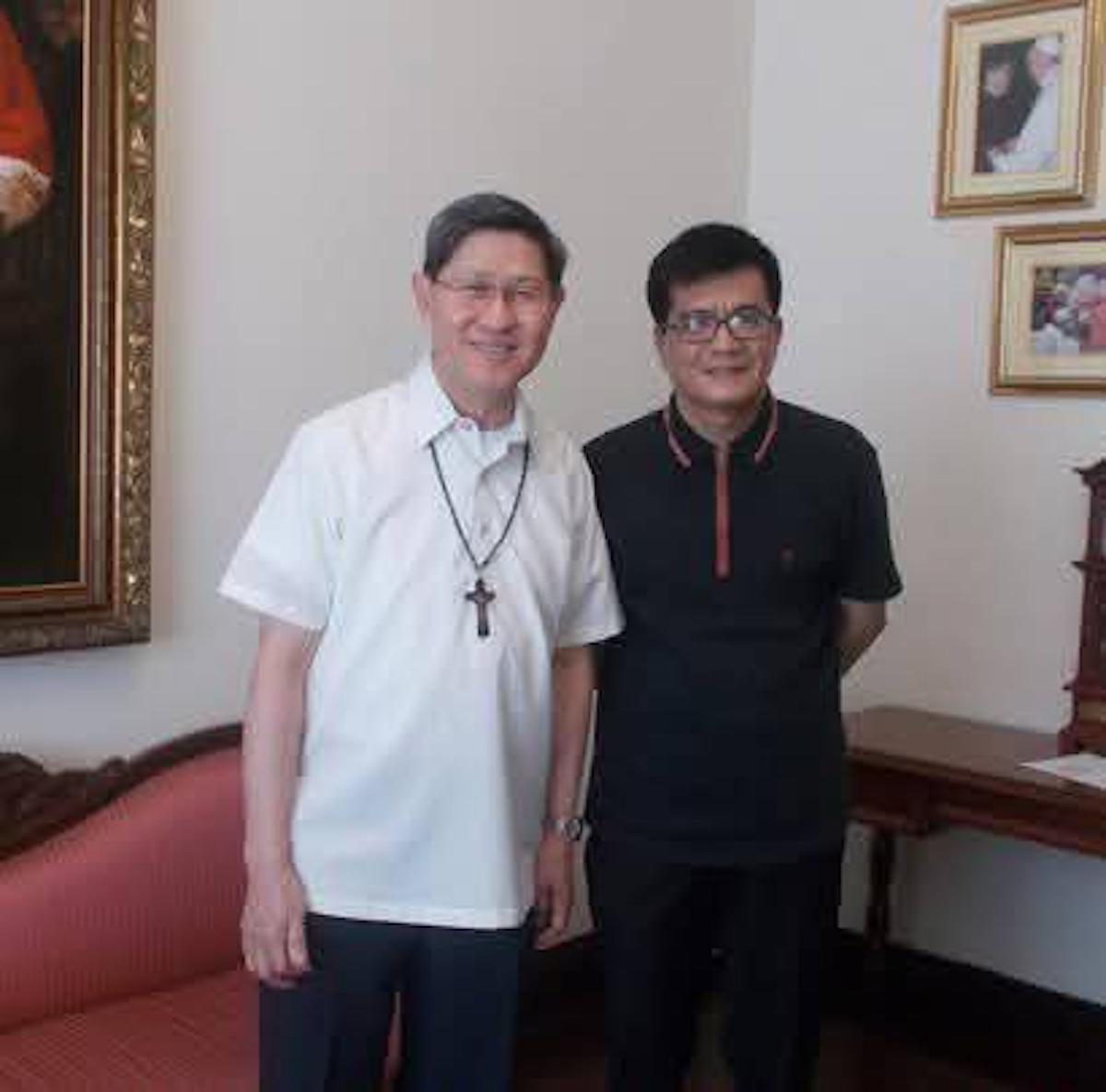Cardinal Luis Antonio Tagle (left) with AJ columnist Rogelio Constantino Medina. Photo courtesy of Rogelio Medina
I vividly remember I asked Cardinal Luis Antonio Tagle why St. Andrew’s School (SAS) in Paranaque City, where he finished his elementary and high school education, has produced a lot of priests?
“That’s a very good observation. I did not realize a number of priests until (during) an alumni homecoming, they invited me for a Mass alumni. I discovered that some of my former students (in philosophy or theology subjects) also came from SAS,” remarked Cardinal Chito as he is fondly called.
He continued: “Of course, vocation is a grace from God. I think the SAS also contributed to the blossoming of the vocation, the solid religious and catechetical courses. We were introduced to the Catholic faith and Catholic tradition in a manner that was appropriate for our age or our mentality. Secondly, it was not just in the classroom, and we participated in the Mass, in the parish. We got involved in the choir, the students who did the readings, there were benedictions in the afternoon. So the teacher in the classroom was complemented by participation, especially the liturgical participation, in the parish. For me also, the introduction of SCA and also during first-year high school the Crusaders… We were being initiated into Christian leadership. You don’t only learn about the faith, you don’t only participate in celebrations. You’ve the responsibility as a future Christian leader. There were talks about vocation, recruitment. These were the factors that help the students, like me… I was very much edified by the example of the C.I.C.M. (Congregation of the Immaculate Heart of Mary) path. Yes, how simple lifestyle, how dedicated to mission, whether in the school or in the parish. Focus. Go to the essentials of mission. It was a big, big impact on me too.”
Interestingly, Tagle’s original plan was to enter the medical school, to be a doctor, but his involvement in youth activities in the school’s parish and religious education in SAS, plus his involvement in the Parish of Nuestra Senora del Pilar in Imus, Cavite somehow all have contributed to the eventual decision to enter the seminary.
When he entered college at the Ateneo de Manila University in Quezon City, he was thankful for his high school alma mater for giving him a solid foundation. “The learning and formation I got from SAS was deepened by my Atenean education. In SAS, Pro Deo et Patria (for God and country). In Ateneo, be men and women for others.”
During the martial law years, he experienced the nationalistic atmosphere in Ateneo. He attended some of his philosophy, theology and psychology courses in Filipino. “We were asked to discover our Filipino roots and express ourselves in our native tongue.”
As a young student, Tagle admitted he was quite an introvert, staying in one corner and just observing and listening. If you give him a book, he would just read it.
He shared to me an anecdote that during their time the students did not buy books for they borrowed books from the school and returned the books properly. “One good thing SAS taught us is stewardship. You take care of the books for the next generation. Just as we need to take care of creation so we could pass on to the next generation for a better world, a cleaner environment. In SAS, that was already practiced especially through the books.”
So how does his education at SAS, and later Ateneo, molded his outlook toward life? It is not only education for personal growth but also education to be a worthy citizen, to contribute to the wider community.
For him, it is a continuum – two segments of the same movement, the same discipline, the same quest for excellence of whatever you are doing.
His piece of advice to the youth is “learn how to develop their gifts and to make full use of the opportunity in their lives, not for personal gain or interest but for the good of society and the nation. The whole of society will not progress unless each one does his or her share. Sometimes our tendency is to pass the responsibilities to a few. You’re the mayor so you take care of the city. Or you’re the senator so you take care of the people. No, all of us must do our share and that is what we call working for the common good. All of us must participate in promoting the good of the society. Having that attitude or value embedded in the young, it would become a habit and a virtue for them when they grow old.”
He also made an appeal to everyone to rediscover “pagpapakatao” or “pakikipagkapwa-tao”.
He encourages us not to allow violence to terrorize a whole community. “Let us teach especially the young generation how to be human and how to be good neighbors because all of this violence would try to divide us and make us suspicious of one another, prejudice against one another, bias against one another. We should resist that. If that continues, terrorism has succeeded… We have to do a lot of work on the children, the neighborhood. We support the common effort in giving the children some sort of emotional, psychological healing or first aid so that prejudice, bias, vengeance… would be tempered. We continue living as human beings to one another.”
* * *
rogeliocmedina@yahoo.com







